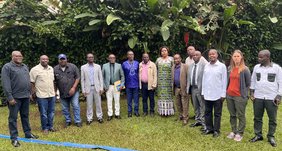Revitalising the Management of the Itombwe Nature Reserve and Collaboration with the Local Population
Categories: Ausgabe 68, Protective Measures, Democratic Republic of the Congo, Itombwe, Grauer's Gorilla
Since 2021, relations between the Congolese Institute for Nature Conservation (ICCN)/Itombwe Nature Reserve (INR) and the local population of the Itombwe Nature Reserve have deteriorated, with consequences for activities in the reserve. A large part of the reserve was not monitored from 2021 until early 2024, in particular the gorilla concentration zones, such as the Basile village group and the Kigogo village group at Luindi. A few patrols were carried out in the Ulindi sector, in a zone close to Mwenga. This conflict has caused the deterioration of the good relations that previously existed between these chiefdoms and the ICCN, leading to the degradation of biodiversity and the discouragement of most of the partners who should be contributing to the sustainable management of this Protected Area and to the socio-economic development of the local communities. The conflict has led to the Grand Chief (Mwami) of the Basile Chiefdom, Mr Kalenga Riziki Lwango, prohibiting eco-guards from entering the forest under his jurisdiction, thereby closing this part of the INR to conservation activities.
The main challenges to conservation in the reserve are as follows:
- Threats resulting from illegal human activities, such as the resurgence of commercial and subsistence hunting, the search for timber (planks), grazing on the highlands, fires and shifting cultivation in the multiple-use zone and artisanal mineral exploitation.
- Weaknesses and constraints due to the lack of equipment, both in the field and in the office, low staff motivation and poor governance, in particular the deterioration in the climate of collaboration between the reserve and other stakeholders, the refusal of access to the forest by traditional chiefs in the Basile chiefdom, and the concerns of local communities regarding natural resources and the support they expect.
However, assets and strengths for the conservation of the INR remain, as follows:
- High biodiversity, with several flagship animal species (eastern lowland gorillas, elephants, chimpanzees), constitutes the first asset for conservation. Status as a category VI Protected Area with multiple-use zones, a buffer zone and a priority conservation area. Monitoring of freshwater ecosystems (rivers), which are rich in ichthyofauna. The appointment of site managers who are not originally from the local zones of the INR and the knowledge of the INR boundaries by several members of the community. The presence of the site headquarters in Mwenga with staff that are both patient and aware of their mission, the subdivision of the reserve into sectors, the awareness of the local communities of the importance of biodiversity conservation, local recruitment, the existence of management programmes and the abundance of medicinal plants used by the community.
Revitalising reserve management
In order to improve the management of the Itombwe Nature Reserve, the ICCN has assigned new managers to the site. They commenced work by identifying all the challenges to be met, as well as the assets and strengths of the INR, with the aim of restoring order to the management of the reserve. Restoring order requires the participation of all stakeholders. To achieve this, the site manager decided to meet with the stakeholders to identify the basis for a new direction for activities. The first steps were as follows:
Contact technical and financial partners. On 11 January 2024, all the INR's technical, scientific and financial partners met at the Horizon Hotel, Bukavu, to discuss what action needs to be taken and the support that will be required in 2024. A total of 14 people took part in the meeting, including supporting partners, representatives of the Itombwe site, the ICCN Provincial Directorate and a moderator.
During this meeting, the current status of the reserve was presented and an operational plan was discussed. Comments were then made before adoption of the operational plan. Each partner presented the activities they were planning to conduct in 2024 or the support they intended to provide.
Revitalising relations with traditional chiefs. After identifying the challenges, two resolutions were adopted, namely the need for involvement of all stakeholders in the governance of the reserve and the reinitiation of dialogue with the neighbouring communities, especially those of the Basile chiefdom. As part of the implementation of these resolutions, the traditional Grand Chief of the Basile chiefdom organised a dialogue for 20 March 2024, during which all the problems between the INR and the chiefdom were examined. Proposed solutions were put forward and a final statement was signed by all parties.
Subsequently, the traditional chiefs reopened the forest with traditional ceremonies and authorised the eco-guards to resume their activities in the Kalungu patrol post, which had been closed since 2022.
Patrol activities carried out from January to March 2024
Three major patrols were carried out, one in January in the Ulindi sector and two in February and March in the Mulambozi sector and in the Mwana valley.
These three patrols, which lasted a total of 38 days, covered 134 quadrants measuring 2.5 x 2.5 km out of a total of 1,009 quadrants constituting the reserve, i.e. 13.46 % of the reserve. These patrols are ample proof of the resumption of good collaboration between the INR and the local communities.
In the Ulindi sector, the patrol lasted 9 days and covered 19 quadrants. No evidence of the presence of gorillas was found in this sector
In the Mulambozi sector and the Mwana valley, two patrols - one lasting 14 days in February and one lasting 15 days in March - took place. These two patrols covered 42 and 73 quadrants, respectively. They identified five gorilla sites and observed several chimpanzees.
Claude Sikubwabo Kiyengo and Séguin Caziga Bisuro

